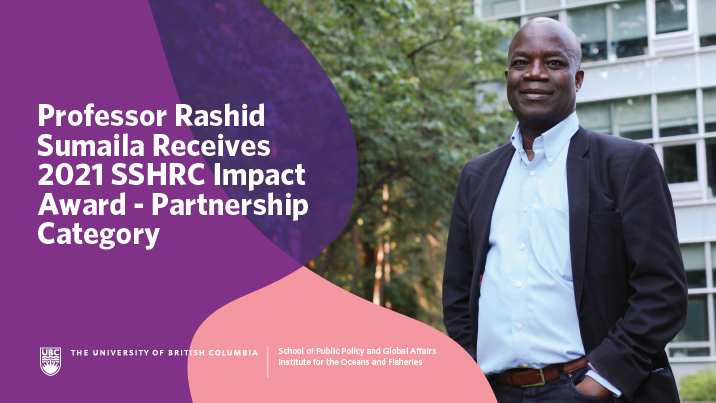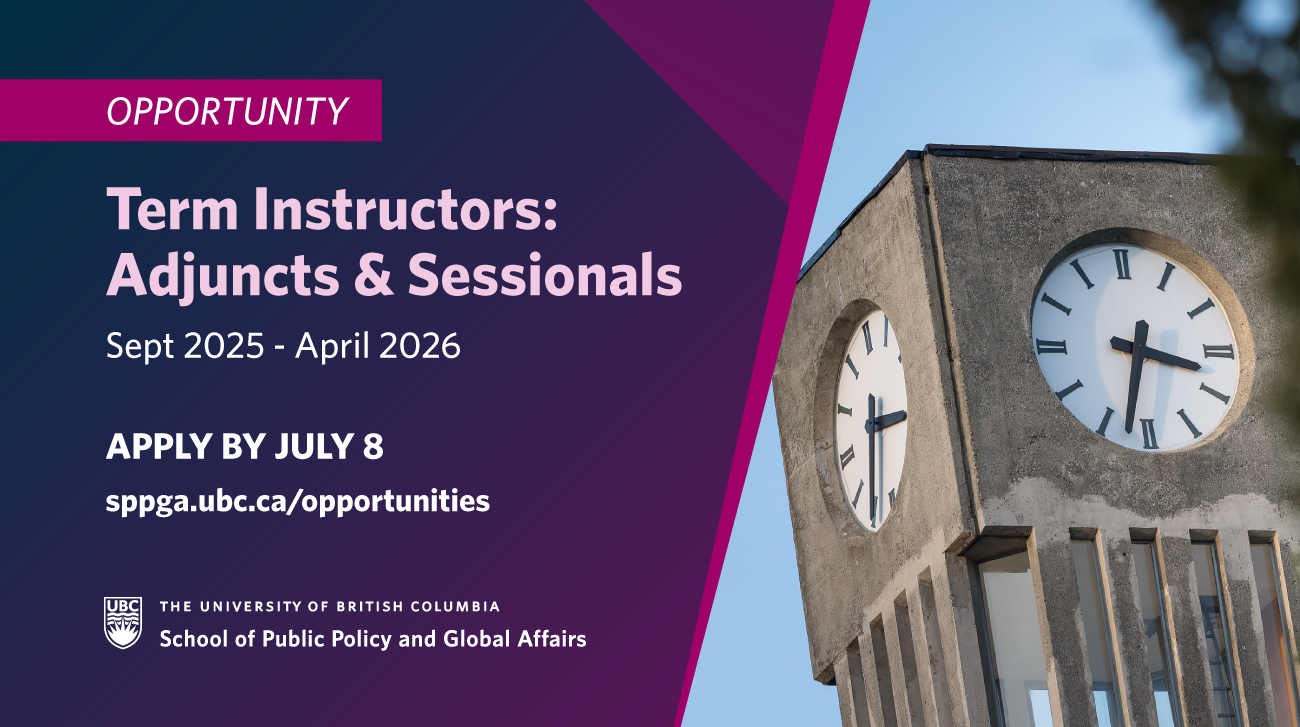

Dr. Rashid Sumaila is the recipient of the 2021 Social Sciences and Humanities Research Council (SSHRC) Impact Award in the Partnership category, selected by a jury.
Dr. Sumaila is Canada Research Chair in Interdisciplinary Ocean and Fisheries Economics, Tier 1 and Professor with the School of Public Policy and Global Affairs (SPPGA) and the Institute for the Oceans and Fisheries at the University of British Columbia. His research focuses on bioeconomics, marine ecosystem valuation and the analysis of global issues such as fisheries subsidies, marine protected areas, illegal fishing, climate change, marine plastic pollution, and oil spills.
The outstanding qualities of Dr. Sumaila’s research, the importance and impact of his work, and his commitment to promoting the outcomes of his research to the public and policymakers have merited his winning the 2021 Impact Award. The award distinguishes him as part of a select group of Canada’s most exceptional researchers in the social sciences and humanities.
As Scientific Director of the OceanCanada Partnership, a SSHRC-funded research initiative, Dr. Sumaila will receive the Impact Award on behalf of the team. Their interdisciplinary initiative seeks to understand and address threats facing Canada’s coastal regions and to develop a shared vision for the future of Canada’s oceans that promotes the well-being of people living on coasts as well as the marine environment.
SPPGA spoke with Prof. Sumaila about what drives his research, the OceanCanada Partnership, and what this award means to him.
SPPGA: What drives your research? What global issues keep you up at night and why?
One of my motivators as an academic is I can wake up with a little idea, then before you know it, many people can be talking about it!
The ocean connects us in a way that not many things do. We essentially have one global ocean as the “Connector of the World.” Starting in West Africa, I know how important fish are to people. The thought that we might end up with a dead ocean and leave future generations with nothing scares me, also for the millions of people who currently depend on fish for their livelihoods.
I really enjoy working with students and colleagues in interdisciplinary settings – that keeps me going. When I wake up every day, I think about what I can contribute to help and to show that we can pass on a healthy ocean to our grandchildren.
SPPGA: How does your work influence public policy?
In terms of policy, we have good strategies. We survey the environment and take stock of what would be meaningful to convey to policymakers and Canadians. During the first federal election of Justin Trudeau’s Liberal government, we came together to write a policy paper, Canada at a crossroad: The imperative for realigning ocean policy with ocean science, published in Marine Policy and led by Canada Research Chair, Megan Bailey, member of OceanCanada and a former student. The paper was released just before the votes were counted as a message to the winning party about the four things they need to do if they care about the oceans. CBC interviewed me and we had 8,000 shares of the interview within a few hours! Trudeau’s government quickly implemented the first three items on the list and the fourth item was implemented since, surely due to pressure from other groups as well. That’s a practical policy impact.
As another example, in 2012, I was invited to give a talk in Namibia – a country largely focused on fisheries and diamonds, with so much conflict between the two along the coastline. In the room were three African Ministers of Fisheries (of Namibia, Sierra Leone, and the Seychelles) and other high-level African fisheries policymakers, managers, and members of the fisheries and diamond-mining sectors of the country. I stated in front of these policymakers that “fish are actually more valuable than diamonds!” The room went silent. Representatives from the diamond mines were dismayed because I was turning the belief of both sectors, that diamonds are more valuable than fish, on its head.
SPPGA: Could you tell us more about the OceanCanada Partnership? What are some of the ways that the outcomes of this research have been communicated to stakeholders and the public?
The OceanCanada Partnership is a seven-year SSHRC research partnership initiative that was awarded 2.5 million dollars which sought to develop a shared vision for the future of our oceans. The central question we set out to address was: How can Canada maintain healthy oceans and the well-being of coastal communities into the future? So this is not just about biology and economics, it’s also about the people, about culture, about Indigenous peoples.
The OceanCanada name came from a talk I gave to parliamentarians in Ottawa back in 2013 titled “Canada is an ocean nation.” I sent communications to my contacts across the country and built the network from there, with recommendations from people in my network.
We co-created the OceanCanada network with 22 formal research partners, both academic and non-academic, across the country – our research truly spans coast to coast to coast. We have universities, the Department of Fisheries and Oceans Canada (DFO), Port Metro Vancouver, Ocean Wise, the Haida Nation, and non-governmental organizations such as the Canadian Parks and Wilderness Society, Ecotrust Canada, and Oceana, Canada.
Our partners represent different backgrounds including fisheries science, the humanities, filmmaking, economics, law, geography, and even a philosophy professor. The interdisciplinary nature of the partnership is one of the strengths of the project.
Anytime we collaborate, we are stronger – Dr. Rashid Sumaila
We have involved over 100 people including students and Postdoctoral Fellows, many of whom have won awards for their work. Half of the budget was dedicated to training future scholars. This high level of involvement contributed to the success of the project.
We decided early on to develop a project CV to document everything. We’ve had a total of over 490 publications, many in top journals. We have also made 460 presentations and convened 80 workshops, presentations, and public events in Canada and around the world.
As an example of our events, we worked with our partner, the Vancouver Aquarium, to organize public panels with representatives from OceanCanada, commercial and recreational fishery representatives, and Indigenous community members. These community events, held in pre-COVID times, were well attended both in Vancouver and beyond. They received positive feedback from academics due to the community-orientation of this work.
Thanks to our strong communications team, we have created many videos and documentaries and maintained a strong social media presence (see @OceanCanada on Twitter). We’ve enjoyed extensive media coverage, with over 500 print, video, and radio mentions.
There’s no point doing this work if it’s just left in journals. We have to get it out to people who might be able and willing to use this information. – Dr. Rashid Sumaila
We’re now in the process of publishing a book titled Canada’s Oceans: Pathways to Sustainability in a Sea of Change with the aim of understanding the past, present, and future for Canada’s Arctic, Atlantic and Pacific coastal-ocean regions.
The book is organized into five parts: 1) setting the stage; 2) changing oceans; 3) changing oceans, changing access to resources; 4) changing oceans, changing governance; and 5) conclusion. The starting point and central theme for the book is changing oceans, both in biophysical and social terms, and forms the basis for the parts on access and governance.
SPPGA: Congratulations on being awarded the prestigious SSHRC 2021 Impact Award in the Partnership category! Could you tell us what winning this award means to you?
This award is really unique and means a lot to me. We managed to pull together a large, diverse group of people from different disciplines, backgrounds, and perspective and delivered impactful outcomes for Canadians. We brought more people than originally planned and once we gelled, it was magic and we got to do things that non-interdisciplinary groups don’t get to do.
And now we’ve become recognized for this work. I credit our diverse team members and scientific advisory board members chaired by Dr. Rosemary Ommer for helping with the execution, and our communications staff for getting the message out about our work.
Winning an award such as this is great as people want to associate with the project.
And our partnership is still going on, as the book, Canada’s Oceans, is being sent for review. We hope to publish it next year with UBC Press.
Thank you, Dr. Sumaila.


